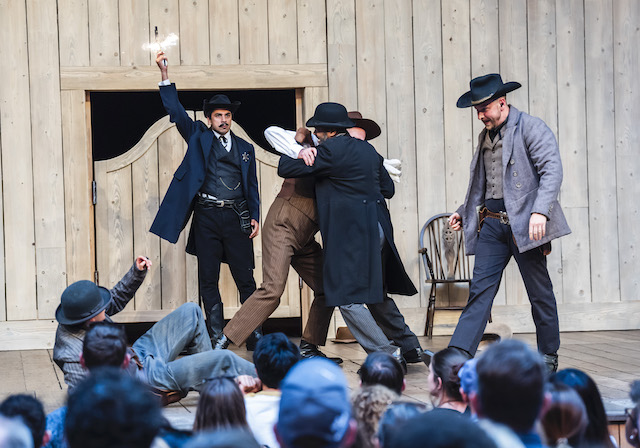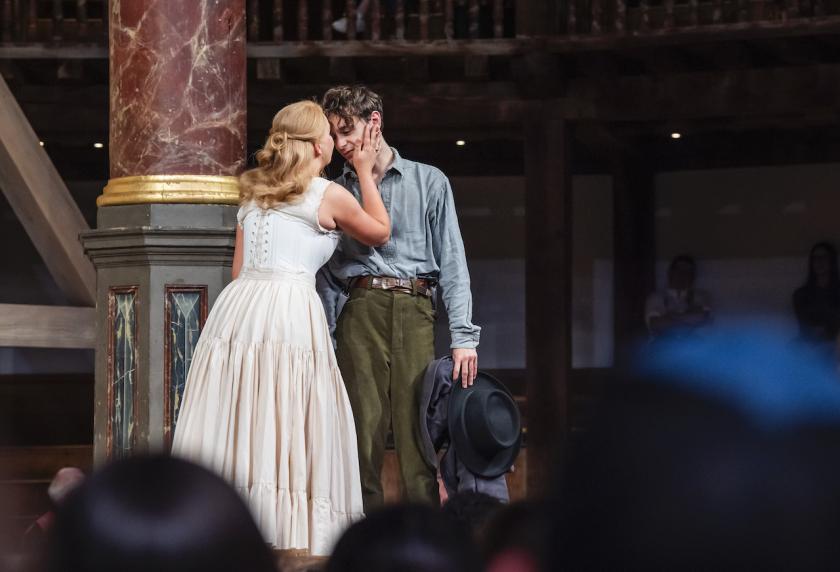Holsters, Stetsons and bluegrass music bring a distinctive flavour to this Wild West riff on Romeo and Juliet that flings us into a vortex of frontier-town politics where men are men and bad girls wear gingham. Sean Holmes’ vigorous production stirs up the original to prove that cowboys can be zombies and that you should always bring a gun to a knife-fight.
There are many bold innovations in this interpretation of the play, but one of the best is the clear indication that Lola Shalam’s bolshy Juliet is far more the daughter of Jamie-Rose Monk’s nurse than of her rigidly elegant mother. Shakespeare already makes it clear that Lady Capulet doesn’t know how to act when she’s in a room alone with her daughter, but here we see that her nurse’s love has given Juliet her accent, her dress sense, and her defiance.
The walls of this frontier town are streaked with blood from the beginning, giving us an appropriate sense of how the swagger and the vivacity cohabit with death. Ever since Baz Luhrmann’s brilliant movie, we have all become alive to how this is as much a play about hormones as romance, and this set-up ably shows how feelings swing from one extreme to the other.
Both Rawaed Asde’s exceptional Romeo and Shalam’s self-knowing Juliet are very early in their careers, and both bring a compelling energy to these iconic roles. Shalam powerfully shows how Juliet evolves from indignation to dignity during this love affair, while Asde reveals himself as a star in the making with his simultaneously cheeky diffidence and muscular charisma.
The scene where Romeo and Juliet meet tilts amusingly from a staid square dance (performed to the tune of Don’t You Rock Me Daddy-O by the Capulet family) to an altogether more feral affair when Romeo and his Montague friends enter. Shalam vividly conveys the sense of a young woman who’s not just waiting for love but wants her whole world to change. It seems apt that the balcony from which she addresses Romeo is not stationary on stage but is wheeled in through the crowd, so she rides it almost like a chariot. When she chides Romeo to “Swear not by the moon. Th’inconstant moon,” it’s not a whimsical piece of poetry, it’s an order. Holmes enjoyed huge success with his production of Cowbois – a 19th century queer Western – at the RSC two years ago, and here he ably demonstrates how to exploit frontier-town dynamics for Shakespeare’s tale of star-crossed lovers. However, he goes beyond traditional Westerns to introduce an intriguing element, in which those who have been killed rise up, zombie-like, and deliver their final lines as living corpses.
Holmes enjoyed huge success with his production of Cowbois – a 19th century queer Western – at the RSC two years ago, and here he ably demonstrates how to exploit frontier-town dynamics for Shakespeare’s tale of star-crossed lovers. However, he goes beyond traditional Westerns to introduce an intriguing element, in which those who have been killed rise up, zombie-like, and deliver their final lines as living corpses.
It’s a potent device for a play in which those who die young continue to exert such a force on the people they have left behind. Not least in the final scene where we see Juliet, alive, in a burial vault, sitting in a row with Mercutio and Tybalt, with the clear implication that she is waiting to join the ranks of the undead.
Great ensemble work from the cast buoys the atmosphere of this giddy seesaw ride between life and death. Michael Elcock is a gentle, anarchically dandyish Mercutio, while Callum Callaghan is flintily thuggish as Tybalt. Jamie-Rose Monk’s cheerfully dominating nurse also makes us feel the tragedy of her own lost child, while Colm Gormley’s Lord Capulet tilts between gleeful patriarchy and bullet-backed tyranny.
It’s a joyous, flamboyant launch to the Globe’s 2025 summer season, not least for revealing two new stars in the title roles. Grant Olding’s music brings both euphoria and shivering unease to a production that resonantly demonstrates not just the elation but also the courage needed to sustain love in a world where violence constantly begets violence.













Add comment